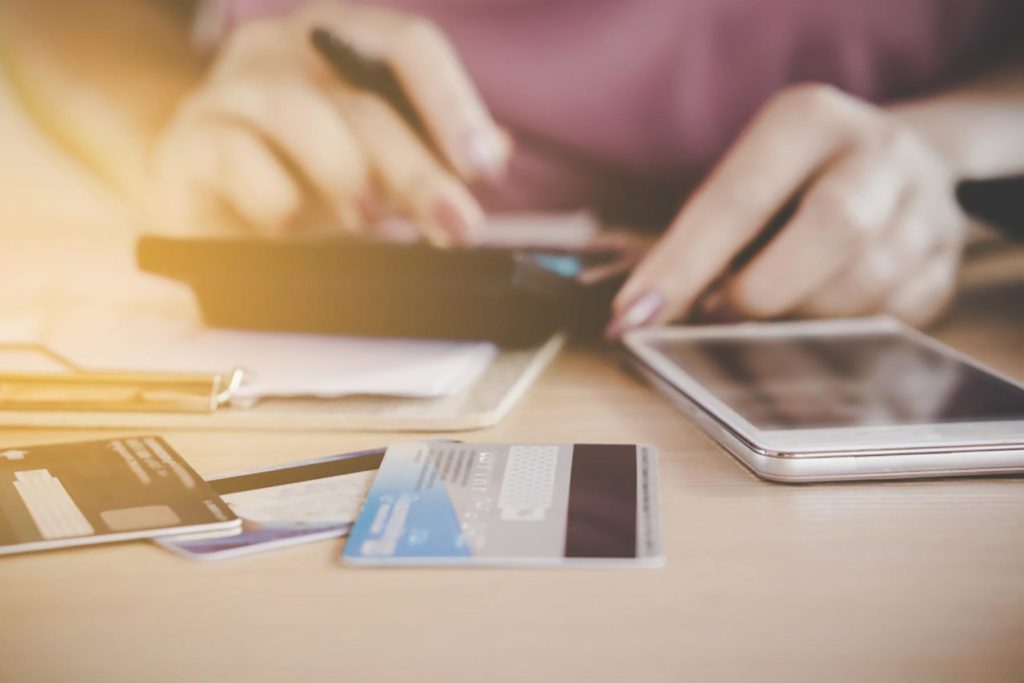Credit card debt is a serious problem in the United States. Americans currently carry a combined total of over $1 trillion of outstanding credit card debt with the average household now carrying a $16,000 credit card balance from month to month. High levels of credit card debt–and the high monthly payments that accompany them–often make it difficult to keep up with your rent/mortgage and other monthly bills; it can also make it challenging to save for retirement or take advantage of fleeting business opportunities. The interest that accumulates on outstanding debt can make it practically impossible to pay off those balances, too.
It doesn’t have to be that way! You can develop a plan to pay off your credit cards and become debt free. When it comes to paying off debt, you have several different options, each with its own advantages and disadvantages depending on your situation. Take a look at the most common ways people address credit card debt, so you can determine what credit card payoff plan is the best choice for you.
Self-payment Initiative
Sometimes, all it takes is personal discipline and perhaps a bit of expert support to get on track to becoming free from debt. If you feel that your credit card debt is out of control, but you’re confident you have the personal wherewithal to address it, you could develop a household budget to start paying down your credit card balances more aggressively. If you need assistance in making a plan, credit counselors and other financial management professionals can provide the support you need to get started.
Not everyone has the ability to simply address credit card debts alone, however. In many cases, the outstanding debt may be too high to pay off without external help, or there may not be enough income to manage the debt payments along with other bills. If paying down credit card balances alone won’t cut it, you’ll have to consider other options.
Debt Consolidation Loans
One frequently used method to address outstanding credit card debt is a debt consolidation loan. With debt consolidation, all your outstanding credit card debt on multiple cards is combined into a new, single loan. Many debt consolidation loans have lower interest rates and longer repayment periods, which helps to lower your monthly payments and make debt management more streamlined.
Debt consolidation isn’t an ideal choice for everyone, though. Borrowers with weak credit will have difficulty obtaining a debt consolidation loan with favorable repayment terms. If your credit rating is particularly poor, it’ll be difficult to qualify for any sort of debt consolidation loan. Additionally, if you’re out of work or otherwise having trouble making any credit card payments, debt consolidation isn’t a good option for addressing your debt load.
Bankruptcy
Another option to address credit card debt, and the one that borrowers who are in the most dire financial straits often use, is bankruptcy. Borrowers choose bankruptcy when they have no other viable option to pay off their outstanding debts, and they need some type of legal relief from them. Bankruptcy should be a last resort, since using it can have serious consequences on your credit for a long time. However, despite their negative financial impact, bankruptcies are common; in 2017, there were nearly 800,000 non-business bankruptcies in the United States.
There are two basic types of bankruptcies for individuals: Chapter 7 and Chapter 13. A Chapter 7 bankruptcy is often used to discharge debts by those who have little in the way of assets with which to pay creditors. A Chapter 13 bankruptcy is normally used to reorganize personal debt for people who do have income of some sort; this bankruptcy process establishes a court-approved debt repayment plan as a way to re-organize your debts. Laws on bankruptcies can vary from state to state, so ensure you discuss bankruptcy options, as well as bankruptcy’s potential negative effects, with your lawyer and financial advisors prior to choosing this method to address your credit card debt.
Debt Settlement
Another option to consider when addressing high levels of credit card debt is debt settlement with a company like National Debt Relief. With debt settlement, the company takes you on as a client, analyzes your financial situation, sets up an account that you pay into, and then negotiates with your creditors to secure payoff terms that are optimal for you. In many cases, debt relief companies can help you navigate challenges with multiple credit card companies and other lenders that you never could have done on your own, and give you the best possible chance of becoming debt free for less.
Debt settlement is a great choice for people who have a job and are earning income, or otherwise have the means to continue paying down their outstanding debt at some level. Having a debt settlement company as an advocate can often help borrowers achieve optimal repayment terms with credit card companies and get them started on the path to being debt free. As always, check with a trusted financial advisor prior to choosing debt settlement as a course of action to determine if this process is a good fit for you.
Get Some Help and Make a Plan
When it comes to paying off your credit card debt, you should never go it alone. Instead, find a trusted financial advisor to assist with analyzing your situation to help you determine the best credit card payoff plan for your situation. Remember, it’s never too soon to decide that you’re ready to get out of debt!





